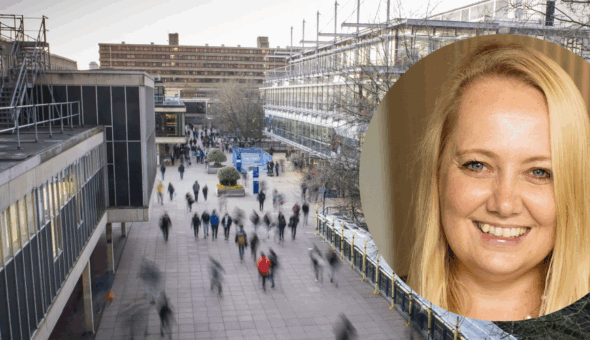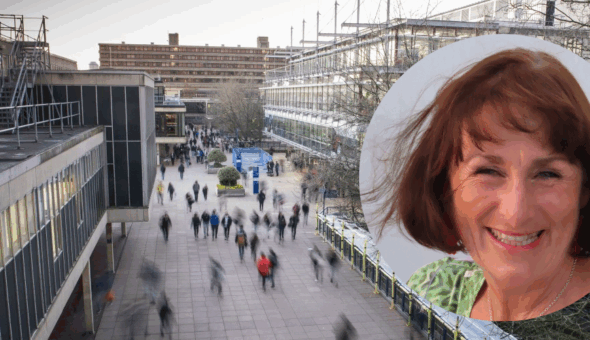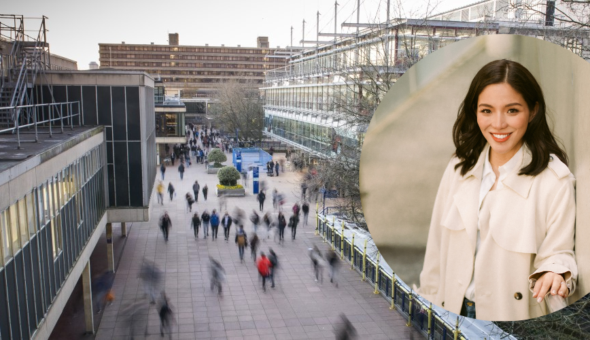While studying at Bath, Jono Hey gained valuable technical skills, lived in France, met his future wife and discovered a life-long passion for innovation and developing creative ideas — or in his own words ‘learning to build things right and then learning to build the right things’.
This led to a fascinating career in engineering, project development and design, and a decade-long project called Sketchplanations: explaining the world through sketches. Jono now hosts a podcast on the same theme with fellow Bath engineering alumni and has a recent book called Big Ideas Little Pictures.
Why did you choose to study at Bath? 
When I applied in 1996/97, Bath was the only university hosting the Innovation and Engineering Design (IED) degree. I was always good at science and maths, but during A-levels, I loved art — plus I have always been drawn to ideas and new products, so the course was right up my street.
I also had the option to do the course ‘with French’ which meant I had engineering lectures in French, a year working abroad in France and six months doing my master's project at a French university. Bath's engineering department was also well-regarded and forward-looking.
When I visited the University, I thought the city was beautiful. I loved the size of the University, its location and the sports facilities, including the amazing new 50-metre pool.
All taken together, it was an easy choice.
Did you have a particular career in mind when you chose your course?
If I had to choose, it would have been new product development. But at the time, I was also interested in research and academia; my family has been involved in universities and teaching for as long as I can remember. My hero at the time was Leonardo Da Vinci — the ultimate polymath. I was different to some people in my course, like those studying aerospace or automotive engineering who already knew what they wanted to do. Part of what I liked about the programme was how many options it still gave me when I came to the end.
Can you tell us about your experience of studying here?
I have great memories of the whole time: from my first year on campus in Eastwood to living in town, and the 18 months I spent in France.
Thanks to the course, I spent a year in Annecy, near Geneva, working in the design office of an engineering company. Annecy is one of the most beautiful towns I've ever visited, nestled in the foothills of the Alps at the head of a nearly 10-mile-long lake. I was lucky to live and work with two others from my course and another friend nearby in Lyon that year. We had a fantastic time working on our French, engineering (somewhat) and skiing — and we're still close friends.
Bath gave me so many memories. I took some unforgettable courses in the old Arts Barn, including glass etching, wicker sculpture and life drawing. I played in the football team; I still see several team members today. A particular highlight was playing Bristol at Bath City FC's stadium in town. I remember a lot of laughs on long coach journeys around the country on Wednesdays, dressed in a suit, before returning for a night out.
It was still early days for email and the internet. I distinctly remember being on the new library's computers when a friend suggested I try a new search engine that did a better job than AltaVista — it was called Google.
I hurt my knee in France (while skiing, of course) and couldn't play football when I returned for a while. Instead, I went swimming in the fabulous pool. At first, the 50m felt like a sea, but I got comfortable with it, and finishing my workout in the lane next to the Olympic swimmers was great.
Most of all, my wife Maria (BSc Biology 2001) and I got together during our second year. We spent a lot of time around exams playing tennis, and she was brilliant at exploring Bath and getting on her bike.
Describe your career journey since graduating.
I was thrilled to release a book called Big Ideas, Little Pictures, this year. The book is the culmination of a decade-long project explaining the world one sketch at a time called Sketchplanations. It collects 130+ sketches, sharing my toolkit for life. I was fortunate enough to have some great early reviews, including from Bill Gates (I did illustrations for his 2022 book How to Prevent the Next Pandemic).
I also host a Sketchplanations podcast with two other Bath engineering alumni: the entrepreneur and inventor Tom Pellereau (winner of the 2011 Apprentice) and Rob Bell, a TV presenter and broadcaster specialising in science, technology and engineering.
I didn't imagine myself as an author though. I think of my trajectory as learning to build things right and then learning to build the right things. By that, I mean that I first figured out how to solve engineering and design problems creatively, but the solutions weren't always what people needed (spray sugar was a concept we developed that comes to mind). Later, I learned how to figure out what people needed in the first place. If you can make the right things and you're making them right, it's a powerful combination.
Tom Pellereau and I loved what we learnt in our Advanced Design Methods course. After leaving Bath, we worked in Belgium with a remarkably creative and productive industry lecturer from that course, Darrell Mann. We helped develop software for creative problem solving and consulted on engineering and innovation problems. It was a tremendously creative time. I was so fascinated by the methods we used, based on the Theory of Inventive Problem Solving and the practice of creativity, that I applied for a PhD at a US university to study new product development. I spent the next seven years in the Bay Area, with five of them studying and researching new product development at the University of California at Berkeley.
Since returning to the UK, I've helped build and scale two successful tech companies — Nutmeg and Zen Educate — running a mix of user experience and design, product delivery, product management and software engineering.
In March this year, I decided to spend more time working on the sketches, supporting the book launch, taking a break with family and making music.
How did your studies help you to develop?
Even though I couldn't have predicted my journey, Bath was excellent preparation for my career. I made strong and well-rounded friends for life who inspire me with their skills and what they've achieved since. The technical grounding I had at Bath enabled me to survive tough exams at UC Berkeley on the PhD programme with some of the top graduate students in the world, and the ideas and techniques I learned in the Innovation and Engineering Design course have continued to influence how I think and how I approach problems.
The master's course at Bath included a six-month group project. Figuring out how to manage your time and coordinate as a self-managing team has proved invaluable to me time and again.
I kept busy with sport and fitness during my time at Bath, which has led to 20 years of using sports to meet new people — such as when arriving in California by myself — taking part in charity challenges and competing in endurance events with friends. Time in the 50m pool set me up to take up the sport of swimrun with other friends from Bath and some epic swims, including the Thames marathon and, this year, the River Dart 10k.
The language skills I learned at Bath from the course are with me to this day. They gave me an appreciation of other cultures and languages, so I always embrace opportunities to explore new environments and countries. It's made me a much more rounded person.
Together with my wife Maria, we have two young boys. We've now been together for more years than we've been apart. I have a lot to be thankful to Bath for!
What advice would you give to prospective students thinking about studying your course at Bath?
As I've progressed in my career, I've inevitably had more management and leadership responsibilities. It's hard to build strong technical skills at work now. So, I'm grateful for the foundation I had at Bath and would encourage everyone to get stuck into a time where they can really develop their technical skills. The management and leadership will come — it'll be hard to avoid — so make the most of becoming an expert in something while you can.
University is a multifaceted experience; try to make the most of all the experiences Bath has to offer including sports, socials, clubs, arts, languages, travel etc. It doesn't always seem so when you're in it, but it's a precious time filled with experiences that are hard to get any time after.
And keep an open mind on who you meet romantically — you never know, you might be with them decades later.
What motivates you to donate to Bath, and what would you say to others thinking of doing the same?
In the US, I saw how tightly universities and alums remain connected. Alums influence a lot of the experience at a university through sharing their connections, experiences and time, and carrying the name forward into their careers. And, of course, they can also help with their money. It made me realise that everyone who's been through Bath is part of a community and can support each other to succeed. I still remember guest lectures from Bath alums while I was there.
I was also incredibly fortunate to begin my university career while it was still free. People make much larger sacrifices to attend now. A donation and opportunity to share my experience after university with current students is something I'm delighted to do.
Respond



